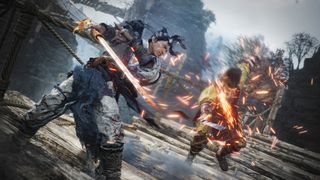Wo Long dev says sorry about the crappy PC version but the thing is, you see, there are lots of types of PC
The game's beset by negative reviews based on performance issues.

Team Ninja's Wo Long: Fallen Dynasty was released March 3 on Steam, since when it has acquired mixed reviews at best with a more recent trend towards the overwhelmingly negative. The reason is little to do with the game's quality, with the console versions receiving pretty good reviews, but the many problems that continue to plague the PC version months after release: every negative Steam review I've seen mentions some performance problem, with the most recent summing up a collective sentiment of "not worth your money on PC".
The situation hasn't been helped by Team Ninja's usual ninja-like approach to public communications, but now the studio has posted the first in what will presumably be an ongoing series of letters from the Director, written by Wo Long's director and producer Masakazu Hirayama.
The letter mostly outlines the new content coming to the game, presenting a roadmap of free and paid-for DLC additions running up to December. Probably the most notable free elements are a new boss rush mode, plus collaborations with Nioh and Lies of P, but the substantial new elements are all in the two paid-for packs.
Then we come to a section headed "optimization and bug fixes for the PC version" where Hirayama addresses the elephant in the room and starts off by apologizing to PC players.
"We can’t talk about the future without talking about the past and present difficulties with the game," said Hirayama. "We apologize for the inconvenience caused to everyone playing the PC version of Wo Long since its release. I can assure you that the development team has read each and every report posted on various bulletin boards, social channels, our customer support department, and we have placed top priority on optimization and bug fixes."
Very well, though Hirayama then makes a rather odd point about PC as a platform which, while true, isn't a terribly good rationale for a studio of Team Ninja's resource and experience shipping a shoddy PC port:
"However, there are many combinations of PC environments in each household, and while our team continues to expand the environments where the game is checked post-launch, it will take time to replicate issues and properly fix them," said Hirayama. "I promise that we will continue to make improvements so that you can play with peace of mind as soon as possible. We apologize for this delay."
The biggest gaming news, reviews and hardware deals
Keep up to date with the most important stories and the best deals, as picked by the PC Gamer team.
So… sorry for the bad port and, sorry, but you're gonna have to wait a while longer for fixes. This would probably have landed better if it wasn't being said immediately below the announcement of monthly DLCs, because that makes you consider priorities. The base version of this game clearly isn't working very well for a considerable number of players on PC, who have paid good money for it, and one has to wonder what value any extra content could possibly bring while that remains the case.
Team Ninja has at least acknowledged the problem, but this feels like a poor showing from what is one of Japan's premiere action game studios. I played Nioh on PC and it was great, so it's not like it hasn't done good work on PC before, and the problem is less launching the game in a bad state than seeming like it's in no rush to fix it. Apologies and roadmaps are all well and good, but some people just want to play the game they bought without technical issues blighting the experience.
Rich is a games journalist with 15 years' experience, beginning his career on Edge magazine before working for a wide range of outlets, including Ars Technica, Eurogamer, GamesRadar+, Gamespot, the Guardian, IGN, the New Statesman, Polygon, and Vice. He was the editor of Kotaku UK, the UK arm of Kotaku, for three years before joining PC Gamer. He is the author of a Brief History of Video Games, a full history of the medium, which the Midwest Book Review described as "[a] must-read for serious minded game historians and curious video game connoisseurs alike."
Most Popular







